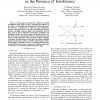Free Online Productivity Tools
i2Speak
i2Symbol
i2OCR
iTex2Img
iWeb2Print
iWeb2Shot
i2Type
iPdf2Split
iPdf2Merge
i2Bopomofo
i2Arabic
i2Style
i2Image
i2PDF
iLatex2Rtf
Sci2ools
ICC
2009
IEEE
2009
IEEE
Opportunities, Constraints, and Benefits of Relaying in the Presence of Interference
In this paper the interference channel is extended by additional relay nodes in order to investigate the influence of interference on the design and performance of relaying protocols. We introduce a framework in which the relay interference channel is decomposed into a cascade of individual interference channels with finite conference links at the transmitters. Each of these stages is able to implement interference cancellation and mitigation schemes such as dirty-paper and Han-Kobayashi coding. We discuss the dependencies between individual stages and propose specific approaches with reasonable complexity. Finally, we compare the performance of these protocols using a simplified channel and geometry model of a mobile communications system. It shows that a reasonable choice is to coordinate the feeder links using distributed dirty-paper coding and to mitigate interference on the relay to user link using Han-Kobayashi coding.
Communications | ICC 2009 | Individual Interference Channels | Interference Channels | Relay Interference Channel |
| Added | 18 Feb 2011 |
| Updated | 18 Feb 2011 |
| Type | Journal |
| Year | 2009 |
| Where | ICC |
| Authors | Peter Rost, Gerhard Fettweis, J. Nicholas Laneman |
Comments (0)

